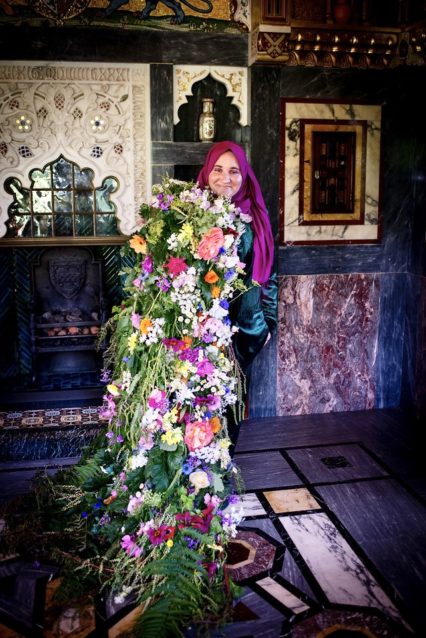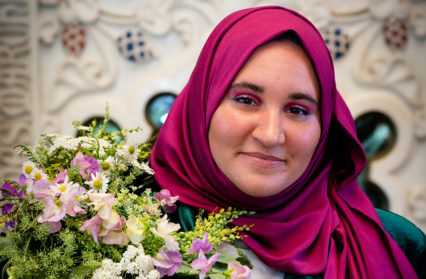Darren Chetty speaks to Hanan Issa about her new role as National Poet of Wales, considering the public’s reaction to her appointment, the poetry landscape in Wales, and what she hopes to do while in post.
Darren Chetty: Hanan, congratulations! It’s now over a month now since you were announced as National Poet of Wales – what was your reaction at the time? And how have your first weeks in office been
Hanan Issa: Firstly disbelief, then a bit of imposter syndrome but mostly excitement at all the possibilities of what the appointment could look like. The prospect of someone like me as national poet is still quite a novelty so there’s been an unexpected amount of interest from the media but it’s been nice having some time to settle in before my first official Literature Wales commission in September.
Darren Chetty: Tell us about your photoshoot!
Hanan Issa: Well, I felt it was important to make a bold statement. I wanted something that visually expressed my intention to honour both the past and future of my Welsh heritage but also spoke to how histories of different places in the world are intertwined.
It was kind of a dream come true since I came across the Arab Room in Cardiff Castle when I was at Uni and made a naïve promise to myself that, at some point in the future, I would have a photoshoot there. My cape was crafted by the skilled hands of Flowers by Grace and Emma from Wenvoe Flower Farm. I’d worked with Grace on a previous project so knew my vision was in safe hands although I didn’t quite expect the cape to be that magnificent – or that heavy!
All the flowers and foliage were grown locally and were chosen for their significance to Wales. The broom, meadowsweet and oak flowers are present as they were used to create the maiden Blodeuwedd of the Mabinogi legend. It was my way of saying I exist here, a hijabi Muslim woman cloaked in the blossoms of ancient Welsh folklore, but in a space that celebrates both my Welsh and Arab heritage.
 Darren Chetty: A few anonymous accounts on social media have tried to use your appointment to further their racist views – was this a surprise to you?
Darren Chetty: A few anonymous accounts on social media have tried to use your appointment to further their racist views – was this a surprise to you?
Hanan Issa: Not at all. In fact, I expected much more backlash – Literature Wales had a robust safeguarding procedure in place but the response has been overwhelmingly positive. So much so that when I did come across these few random accounts who weren’t happy or suggested I was a diversity hire etc. – I didn’t feel compelled to engage seriously at all.
Darren Chetty: It must be great to have this kind of recognition as a poet – what does being National Poet mean to you?
Hanan Issa: It’s quite hard to articulate. As an artist, it’s definitely validating to have industry professionals decide your work is worthy of such a post but there’s a certain amount of panic and doubt that comes with knowing that. I’m resolved to stay present and enjoy the appointment as much as I can as well as continue the work I started with Where I’m Coming From to support/platform Welsh writers.
Darren Chetty: I first met you when I read at ‘Where I’m Coming From’ the spoken word event you founded with Durre Shahwar. For those who don’t know, can you explain the thinking behind WICF?
Hanan Issa: WICF was my and Durre Shahwar’s response to the assertion made by Welsh literary professionals that the reason there wasn’t much POC representation here was because there just wasn’t any POC talent present in Wales.
We began hosting open mic sessions in Cardiff that ran with a loose structure of platforming predominantly but not exclusively writers of colour. We held sessions every month and not once did we struggle to find writers of colour to feature. Since then, many of the people we platformed first have gone on to secure publishing contracts here in Wales and elsewhere. The entire experience taught us so much, not least that there is always talent – you just need to find it and allow writers the time and space to hone their craft.
Darren Chetty: Who are the poets that you read and heard that made you fall in love with poetry?
Hanan Issa:I often think about this question because I can’t remember a time before poetry, as in I don’t think there ever was a point we weren’t ‘in love’. The poets that make me swoon, gasp out loud and run for a notebook are people like Ada Limon, Terrance Hayes, Rhian Edwards, Inua Ellams, Zeina Hashem Beck and Taylor Edmonds who, I’m so excited to say, is due to publish her debut collection Back Teeth in September this year.
Darren Chetty: We worked together with Grug Muse and Iestyn Tyne on editing Welsh (Plural). Your essay in the book suggested ‘care’ as a way of thinking about our relationship with Wales, with place. Can you say a bit more about that?
Hanan Issa: Belonging in general has understandably become entangled with a sense of ethnic/genetic identity as well as an individual’s ties to a specific part of the world. But this has resulted in some very simplistic, and stereotypical, definitions based on aesthetics. I suppose what I’m suggesting is that, since we now live in a global community where the ability to travel and settle in different parts of the world is relatively easier, perhaps it’s time for a reframing of how we decide who belongs where: a sense of belonging based on care – for a place, for a community, is a lot more sustainable since it isn’t restrained by outdated ideas of how a person looks.
Darren Chetty: I saw you perform at my local cinema in Whitechapel London. You went down very well – did it feel different performing poems from ‘My Body Can House Two Hearts’ outside Wales?
Hanan Issa: Absolutely! I realised how inherently Welsh a lot of my poems are. Not just in their subject matter but sometimes in the poem’s delivery etc. I’d argue that we are a lot more comfortable with not taking ourselves too seriously here in Wales. It felt important to read work that spoke about very specific moments in Welsh history such as Trwyeryn to an English audience. I think there’s a worry that the work won’t hold the same poignancy or that the audience won’t engage but I’ve not found that to be the case.
Darren Chetty: What do you hope to achieve in your time as National Poet – personally and for Wales?
Hanan Issa: I’m hopeful this opportunity will give me space to study and hone my craft – Robert Frost talks about writing the poem as discovery and I’d like to think that’s an ongoing process not something that necessarily has an end goal.
For Wales, I’d like to see more collaboration and mutual respect between English language and Welsh language communities. I don’t mean that everyone has to agree on everything but respecting poetic traditions from both languages could perhaps encourage a more unified literary scene.
You can read more about Hanan Issa and her role as National Poet of Wales here.
Photo credits: Camera Sioned












